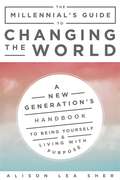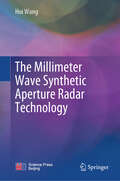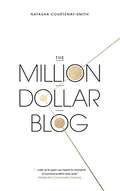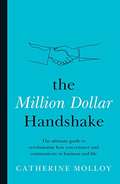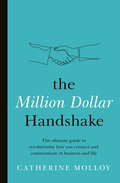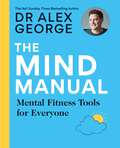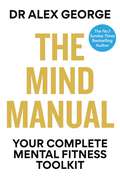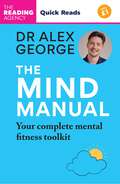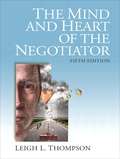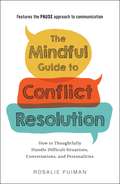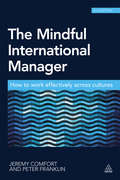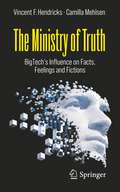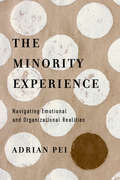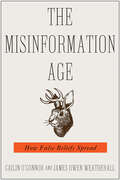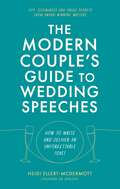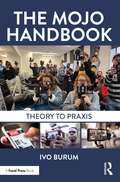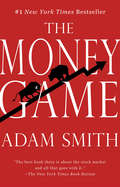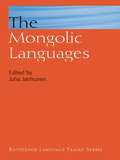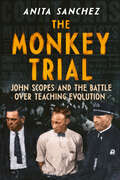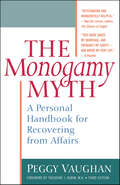- Table View
- List View
The Migrant Project: Contemporary California Farm Workers
by Rick NahmiasThe images in this book highlight the lives of the men and women who struggle to exist while literally feeding this country. Countless words and studies over decades bemoan the plight of those who toil in the fields, but Rick Nahmias's pictures bring farm workers to us in an unforgettable way, taking us beyond stoop labor stills and into their intimate moments and inner lives. Having traveled over four thousand miles to document California's migrant workforce, Nahmias's soulful images and incisive text go beyond one state's issues, illuminating the bigger story about the human cost of feeding America. The Migrant Project includes the images and text of the traveling exhibition of the same name, along with numerous outtakes and an in-depth preface by Nahmias. Accompanied by a Foreword from United Farm Worker co-creator Dolores Huerta, essays by top farm worker advocates, and oral histories from farm workers themselves, this volume should find itself at home in the hands of everyone from the student and teacher, to the activist, the photography enthusiast, and the consumer.Every day in the hot fields of California, hundreds of thousands of farmworkers toil for long hours at low pay to provide fruit and vegetables to feed our nation. Most Americans never see the faces of these hard-working men and women, and know little or nothing about the harsh conditions they endure. The Migrant Project has done an extraordinary job documenting these workers' lives. Rick Nahmias's powerful photographs and the beautiful essays of dedicated advocates tell an inspiring story of the farmworkers' historic struggle for the respect, the dignity, and the justice they so obviously deserve.--U.S. Senator Edward M. Kennedy, Massachusetts Nahmias's images starkly capture both the humanity of the farm workers who literally feed our country, and the inhumanity of a system which has kept them and their predecessors prisoners to poverty for decades. This book is a testament to the flesh-and-blood cost of feeding America.--Arianna Huffington, author, editor-in-chief of The Huffington Post, and nationally syndicated columnistUniversity of New Mexico Press gratefully acknowledges the generous contribution of the Columbia Foundation toward the publication of this book.
The Millennial's Guide to Changing the World: A New Generation's Handbook to Being Yourself and Living with Purpose
by Alison Lea SherA guide and blueprint to a purposeful millennial existence—and how we can make a difference. What does it mean to be a millennial in this chaotic world? Beyond Snapchat and Tinder, the consumerist culture we’ve inherited, and quarter-life crises, can a millennial aspire to more? Alison Lea Sher argues, yes, we can! Packing herself up in an RV, Sher embarks on a road trip in hopes of starting a conversation about what it means to grow up in America, post-Great Recession. Interviewing 150 of her millennial peers as they begin their adult lives—from kids heading straight to Wall Street after college to those sleeping on it—Sher asks: “Who are you; what should you do; and how can you step into your destiny as a stakeholder in society?” The Millennial’s Guide to Changing the World is a one-of-a-kind ethnographic study on the spotlighted millennial generation, as told by millennials—the largest generation in US history that is now transitioning from adolescence to adulthood. As millennials embark on a young adult quest during a frightening time, how can they enlist the idealism, values, and resistance politics they are so well-known for to discover a sense of self and purpose? Learn how to: “Adult”—and not in the way society defines itRide the technology revolution, instead of letting it ride youBe ethical, inclusive, and sex-positive in your relationshipsResist the corporate oligarchy we live inRecognize privilege, embrace diversity, and fight for equalitySave the earth, literally With intimate stories, ethnographic research, and practical tips, The Millennial’s Guide to Changing the World will inspire every young person, showing them how to optimize their coming-of-age potential in a world that desperately needs it.
The Millimeter Wave Synthetic Aperture Radar Technology
by Hui WangThis book highlights the basic theories and technical principles of the synthetic aperture radar (SAR), aiming to bridge theories and applications for readers. Supported by the practical experience of the author's dedicated research, this book also constructs the SAR theoretical system from multiple perspectives.The synthetic aperture radar (SAR) is a weather-independent microwave remote sensing device that involves a number of multidisciplinary fields such as signal processing and image information processing. Written by experts in remote sensing and signal processing, the book explains the signal echo modeling, imaging principles and algorithms, image quality control methods, and image applications. Readers are provided with concise descriptions of commonly used imaging algorithms for SAR in multiple regimes, modes, and applications, including the Range Doppler Algorithm (RDA) and the Frequency Scaling Algorithm (FSA). Continuous wave/pulse regime SAR technology, inverse synthetic aperture radar (ISAR) technology, digital beam forming (DBF), interferometry, and moving target detection methods are discussed in detail.The book is a must-read and comprehensive reference for researchers and engineers engaged in the R&D of the SAR and for graduate students interested in the field.
The Million Dollar Blog
by Natasha Courtenay-SmithIn a world where everyone wants to blog and blog posts are ubiquitous, how do you stand out? How do you blog your way from nobody to somebody?How do you make money blogging, how do you start your own blogging business, and how do you, as a business owner, use content to build your brand and drive your success? What do the world's most successful bloggers know that you don't know (yet)? No matter who are you - a mum at home, a budding fashion blogger, a lifestyle blogger, a food blogger, a big business owner or a small business owner - The Million Dollar Blog is about blogging the smart way. It is the ultimate guide to:*Starting a successful blog*Blog writing*How to monetise your blog*How to develop a personal brand that grows your blog*How to blog for business*How to write*How take your existing blog to the next levelLearn to blog, learn to monetise your blog, discover how to build a successful blog for your business and hear the insider view from those in the blogosphere who are already making big incomes blogging. Plus, discover revenue streams beyond advertising and see how the income of million dollar bloggers is structured for maximum profit. Through a combination of practical advice and interviews with some of the world's most famous and successful bloggers, vloggers and content strategists, including Seth Godin, Lily Pebbles, Grant Cardone and Madeleine Shaw and dozens more, entrepreneur and digital strategist Natasha Courtenay Smith shows you how to build a blog that will increase your profile, create new opportunities, earn money and change your life. No wonder The Million Dollar Blog has been described by leading and award winning mummy blogger Vicky Psarias from Honest Mum as 'Brilliantly written, engaging and inspiring'.
The Million Dollar Handshake: The ultimate guide to revolutionise how you connect and communicate in business and life
by Catherine MolloyThe Million Dollar Handshake is about more than making money - it is also about helping you feel a million dollars.First impressions do count - and few have as much impact as your handshake. A handshake can let the other person know if we are nervous, over-excited, confident or interested in them, and it can tell us so much about that person too, once we learn the signs.A great handshake can lead to a positive outcome, help secure a deal and result in an ongoing relationship. We can make a good or bad impression within just seven seconds of meeting someone.This book shows you how to create a great first impression; offers advice on how to let the other person see that you are interested in them, that they can trust and depend on you; and delves into what you do and don't want your handshake to convey.The Million Dollar Handshake will teach you how to communicate better in all parts of your life, starting with those crucial first seven seconds. But the skills you'll learn won't stop there, because as you realise how your handshake reveals who you are, you'll be inspired to make the positive changes that will result in better first-time and ongoing communication with others.Includes access to exclusive online content featuring interactive training, worksheets an videos.
The Million Dollar Handshake: The ultimate guide to revolutionise how you connect in business and life
by Catherine MolloyThe Million Dollar Handshake is about more than making money - it is also about helping you feel a million dollars.First impressions do count - and few have as much impact as your handshake. A handshake can let the other person know if we are nervous, over-excited, confident or interested in them, and it can tell us so much about that person too, once we learn the signs.A great handshake can lead to a positive outcome, help secure a deal and result in an ongoing relationship. We can make a good or bad impression within just seven seconds of meeting someone.This book shows you how to create a great first impression; offers advice on how to let the other person see that you are interested in them, that they can trust and depend on you; and delves into what you do and don't want your handshake to convey.The Million Dollar Handshake will teach you how to communicate better in all parts of yourlife, starting with those crucial first seven seconds. But the skills you'll learn won't stopthere, because as you realise how your handshake reveals who you are, you'll be inspiredto make the positive changes that will result in better first-time and ongoing
The Mind Manual: Mental Fitness Tools for Everyone (Dr Alex George)
by Dr Alex GeorgeMental health matters! Learn how to assess your mental health today - and understand what's normal for you. Discover the seven universal truths that everyone should remember, and the mental fitness foundations that will boost you. And exercise your mind with the mental health toolkit that will help you thrive. Contents include -Part One: Your Mental Health Today-You are not alone-Know what feels normal for youPart Two: The Seven Universal Truths-Boundaries are beautiful-Mistakes are a must-havePart Three: Mental Fitness Foundations-It's good to talk-Why medical help mattersPart Four: Mental Health ToolkitResources
The Mind Manual: Mental Fitness Tools for Everyone (Dr Alex George)
by Dr Alex GeorgeMental health matters! Learn how to assess your mental health today - and understand what's normal for you. Discover the seven universal truths that everyone should remember, and the mental fitness foundations that will boost you. And exercise your mind with the mental health toolkit that will help you thrive. Contents include -Part One: Your Mental Health Today-You are not alone-Know what feels normal for youPart Two: The Seven Universal Truths-Boundaries are beautiful-Mistakes are a must-havePart Three: Mental Fitness Foundations-It's good to talk-Why medical help mattersPart Four: Mental Health ToolkitResources
The Mind Manual: Mental Fitness Tools for Everyone (Dr Alex George)
by Dr Alex GeorgeYour complete mental fitness toolkit by Dr Alex George'How are you? No really, how are you?'Learn how to assess your mental health today and understand what's normal for you.This is the mental health toolkit that will help you thrive.The Mind Manual is broken down into four parts with each one building on the last. Thegoal is to help you to establish your baseline, to know what peace feels like to you. Andthen to offer advice and tools to help you maintain that as much as possible.Part 1 looks at how to figure out where your baseline is and what normal feels like foryou. It's all about recognising your own needs so that you can best support yourselfwhen issues arise.Part 2 explores the seven universal truths and how they can support you when youmind is telling you lies. These seven truths are: Connection is your superpower; Sleepwill save you; Boundaries are beautiful; Mistakes are a must-have; Stress is the enemy;You are enough; Happiness is an inside job.Part 3 focuses on the foundations of mental fitness and explores the five different areasof life. These include what you eat and drink, how you release stress from your body,how much you move, how to talk out your thoughts and how to approach the medicalside of things.Part 4 is your mental health toolkit, where you'll find a wide range of worksheets andactivity tools to use. These can help while reading the book, but can also be usedregularly in your day-to-day life to check in on how you're coping.
The Mind Manual: Mental Fitness Tools for Everyone (Dr Alex George)
by Dr Alex GeorgeYour complete mental fitness toolkit by Dr Alex George'How are you? No really, how are you?'Learn how to assess your mental health today and understand what's normal for you.This is the mental health toolkit that will help you thrive.The Mind Manual is broken down into four parts with each one building on the last. Thegoal is to help you to establish your baseline, to know what peace feels like to you. Andthen to offer advice and tools to help you maintain that as much as possible.Part 1 looks at how to figure out where your baseline is and what normal feels like foryou. It's all about recognising your own needs so that you can best support yourselfwhen issues arise.Part 2 explores the seven universal truths and how they can support you when youmind is telling you lies. These seven truths are: Connection is your superpower; Sleepwill save you; Boundaries are beautiful; Mistakes are a must-have; Stress is the enemy;You are enough; Happiness is an inside job.Part 3 focuses on the foundations of mental fitness and explores the five different areasof life. These include what you eat and drink, how you release stress from your body,how much you move, how to talk out your thoughts and how to approach the medicalside of things.Part 4 is your mental health toolkit, where you'll find a wide range of worksheets andactivity tools to use. These can help while reading the book, but can also be usedregularly in your day-to-day life to check in on how you're coping.
The Mind Manual: Mental Fitness Tools for Everyone (Dr Alex George)
by Dr Alex GeorgeTHE SUNDAY TIMES BESTSELLER (December 2023)Mental health matters! Learn how to assess your mental health today - and understand what's normal for you. Discover the seven universal truths that everyone should remember, and the mental fitness foundations that will boost you. And exercise your mind with the mental health toolkit that will help you thrive.
The Mind Manual: Mental Fitness Tools for Everyone (Dr Alex George)
by Dr Alex GeorgeTHE SUNDAY TIMES BESTSELLER (December 2023)Mental health matters! Learn how to assess your mental health today - and understand what's normal for you. Discover the seven universal truths that everyone should remember, and the mental fitness foundations that will boost you. And exercise your mind with the mental health toolkit that will help you thrive.
The Mind and Heart of the Negotiator (5th Edition)
by Leigh ThompsonDelve into the mind and heart of the negotiator in order to enhance negotiation skills. The Mind and Heart of the Negotiator is dedicated to negotiators who want to improve their ability to negotiate--whether in multimillion-dollar business deals or personal interactions. This text provides an integrated view of what to do and what to avoid at the bargaining table, facilitated by an integration of theory, scientific research, and practical examples. This edition contains new examples and chapter-opening sections, as well as more than a hundred new scientific articles on negotiations.
The Mindful Guide to Conflict Resolution: How to Thoughtfully Handle Difficult Situations, Conversations, and Personalities
by Rosalie PuimanSuccessfully handle difficult conversations, remain civil, and end an argument peacefully with this straightforward and mindful guide to conflict resolution. It&’s important to share your thoughts and opinions with others—and even more important to be able to do so without starting an argument or offending someone. Now you can prevent and resolve conflicts with help from this guide covering everything from understanding your own emotions better and learning how to address people in different situations, to getting through a difficult conversation, coming to a positive conclusion, and disengaging yourself when necessary. The Mindful Guide to Conflict Resolution provides the essential tools to mindfully communicate during any challenging situation. With this practical and informative guide in hand, you have the power to transform any difficult exchange or disagreement into a positive, constructive conversation.
The Mindful International Manager
by Peter Franklin Jeremy ComfortThe Mindful International Manager tackles the management situations that international managers have to handle every day. Accessible and jargon-free it explains how to clarify local vs. international roles, support and develop a team, organize and coordinate boundaries of time and distance, and win commitment toward common goals. The authors, both interculturalists, include exercises and best practice advice and the experiences and insights of practising international managers. They combine their practical approach with great depth of insight into the challenges of working and managing internationally and include the results of new research findings and cutting-edge case studies on topics such as leadership, global nomads, cultural hybridity, virtual teams, coaching and mentoring across cultures and decision-making.
The Ministry of Truth: BigTech's Influence on Facts, Feelings and Fictions
by Vincent F. Hendricks Camilla MehlsenThe Ministry of Truth scrutinizes the information market in the era of the attention economy calling on citizens, public educators and politicians to action in averting the role of BigTech in critical infrastructure. Through phenomena such as influencers, ‘fake news’, and covid conspiracies, the authors reveal how social platforms control facts, feelings and narratives in our time to such a degree that they are the de facto arbiters of truth. BigTech seemingly controls the information infrastructure and also decides what we pay attention to. The authors suggest hope for a more democratic internet through their systematic analysis of the largest players of the information age. The aim is to amplify human agency for a robust deliberative democracy — not version 2.0 — but a lasting version with staying power. This book appeals to the general interest reader and professional invested in the mobilization of responsible technological development.Vincent F. Hendricks is Professor of Formal Philosophy at The University of Copenhagen. He is Director of the Center for Information and Bubble Studies (CIBS) funded by the Carlsberg Foundation.Camilla Mehlsen is Digital Media Expert and Spokesperson for the Danish child organization Children’s Welfare. She is author of several books on digital literacy and her work on digital media has been published in various newspapers and magazines.
The Minority Experience: Navigating Emotional and Organizational Realities
by Adrian PeiIt's hard to be in the minority. If you're the only person from your ethnic or cultural background in your organization or team, you probably know the challenges of being misunderstood or marginalized. You might find yourself inadvertently overlooked or actively silenced. Even when a work environment is not blatantly racist or hostile, people of color often struggle to thrive—and may end up leaving the organization. Being a minority is not just about numbers. It's about understanding pain, power, and the impact of the past. Organizational consultant Adrian Pei describes key challenges ethnic minorities face in majority-culture organizations. He unpacks how historical forces shape contemporary realities, and what both minority and majority cultures need to know in order to work together fruitfully. If you're a cultural minority working in a majority culture organization, or if you're a majority culture supervisor of people from other backgrounds, learn the dynamics at work. And be encouraged that you can help make things better so that all can flourish.
The Misinformation Age: How False Beliefs Spread
by James Owen Weatherall Cailin O'Connor“Empowering and thoroughly researched, this book offers useful contemporary analysis and possible solutions to one of the greatest threats to democracy.” —Kirkus ReviewsEditors’ choice, The New York Times Book ReviewRecommended reading, Scientific AmericanWhy should we care about having true beliefs? And why do demonstrably false beliefs persist and spread despite bad, even fatal, consequences for the people who hold them?Philosophers of science Cailin O’Connor and James Weatherall argue that social factors, rather than individual psychology, are what’s essential to understanding the spread and persistence of false beliefs. It might seem that there’s an obvious reason that true beliefs matter: false beliefs will hurt you. But if that’s right, then why is it (apparently) irrelevant to many people whether they believe true things or not?The Misinformation Age, written for a political era riven by “fake news,” “alternative facts,” and disputes over the validity of everything from climate change to the size of inauguration crowds, shows convincingly that what you believe depends on who you know. If social forces explain the persistence of false belief, we must understand how those forces work in order to fight misinformation effectively.“[The authors] deftly apply sociological models to examine how misinformation spreads among people and how scientific results get misrepresented in the public sphere.” —Andrea Gawrylewski, Scientific American“A notable new volume . . . The Misinformation Age explains systematically how facts are determined and changed—whether it is concerning the effects of vaccination on children or the Russian attack on the integrity of the electoral process.” —Roger I. Abrams, New York Journal of Books
The Modern Couple's Guide to Wedding Speeches: How to Write and Deliver an Unforgettable Speech or Toast
by Heidi Ellert-McDermottGroom or bride, straight or gay. Nail the perfect words to say.There's no longer an excuse for wedding speeches to be a tedious succession of predictable platitudes, outdated etiquette and cheesy wedding gags. This book is for nearlyweds who want to make their wedding speeches one of the day's highlights.Written by Heidi Ellert-McDermott, award-winning wedding speechwriter and founder of Speechy, this guide will help you write and deliver a speech that's memorable for the right reasons.Heidi's advice has been quoted everywhere from the Daily Mail to the New York Times, and with insights and trade secrets from comedians, TV scriptwriters and wedding influencers, this is the ultimate toolkit for couples wanting to make their wedding speeches a little more wonderful.Create a lifelong memory as you: · Plan the perfect speech line up· Decide how to represent your union 'on mic'· Swot up on modern speech etiquette· Gather cracking content and curate your best material· Discover the simple speechwriter techniques that will help you develop unique, humorous and sentimental lines to add wit and depth to your speech· Learn the trade secrets to delivering like a pro · Get inspired by over a dozen wedding speech examples written by professional speechwriters
The Modern Couple's Guide to Wedding Speeches: How to Write and Deliver an Unforgettable Speech or Toast
by Heidi Ellert-McDermottGroom or bride, straight or gay. Nail the perfect words to say.There's no longer an excuse for wedding speeches to be a tedious succession of predictable platitudes, outdated etiquette and cheesy wedding gags. This book is for nearlyweds who want to make their wedding speeches one of the day's highlights.Written by Heidi Ellert-McDermott, award-winning wedding speechwriter and founder of Speechy, this guide will help you write and deliver a speech that's memorable for the right reasons.Heidi's advice has been quoted everywhere from the Daily Mail to the New York Times, and with insights and trade secrets from comedians, TV scriptwriters and wedding influencers, this is the ultimate toolkit for couples wanting to make their wedding speeches a little more wonderful.Create a lifelong memory as you: · Plan the perfect speech line up· Decide how to represent your union 'on mic'· Swot up on modern speech etiquette· Gather cracking content and curate your best material· Discover the simple speechwriter techniques that will help you develop unique, humorous and sentimental lines to add wit and depth to your speech· Learn the trade secrets to delivering like a pro · Get inspired by over a dozen wedding speech examples written by professional speechwriters
The Mojo Handbook: Theory to Praxis
by Ivo BurumThe Mojo Handbook: Theory to Praxis offers a detailed and engaging crash course on how to use mobile tools to create powerful journalistic stories. Drawing on both theoretical underpinnings and practical techniques, the book outlines the fundamentals of mobile journalism methods, by placing mobile storytelling within a wider context of current affairs, documentary filmmaking and public relations. The book offers expert advice for how to use storytelling skills to transform mobile content into engaging and purposeful user-generated stories for audiences. Topics covered include tips for recording dynamic video and clean audio, conducting interviews on your phone and editing and post-production processes, as well as advice on how to handle copyright issues and a primer on journalistic ethics. The book also includes a comprehensive glossary of terms to help students navigate the video production and mobile journalism world. The Mojo Handbook is a valuable resource for aspiring multimedia professionals in journalism, strategic and corporate communication, community and education, as well as anyone looking to incorporate mobile into their visual storytelling tool kit.
The Money Game
by Adam SmithHailed by the New York Times Book Review as "the best book there is about the stock market," this timeless classic by the creator and host of the Emmy Award-winning TV show Adam Smith's Money World is still relevant more than forty years later This essential book takes readers to the Street to learn about the intricacies of money and how the stock market impacts every area of our lives. According to the author, the key to making wise, lucrative investments is knowing ourselves. In witty, easily accessible language, he shares pithy insights about the role of intuition and the psychology of guilt, arguing that there is no substitute for information. Smith's Irregular Rules shatter common myths and misconceptions, revealing why nothing works all the time and illustrating how greed and fear fuel the market. Readers will learn about the safest types of investing, the key to following market trends, and how to capitalize growth, gleaning tips on stock movers, winners and losers, and much more. Peppered with entertaining and prescient anecdotes, The Money Game analyzes who makes the really big money and explores the meaning of our desire to become rich. From selling short and buying long to Wall Street's crowd mentality, from what constitutes a random walk to why timing is everything, this is the definitive portrait of the Street, then and now.
The Mongolic Languages (Routledge Language Family Series #Vol. 5)
by Juha JanhunenOnce the rulers of the largest land empire that has ever existed on earth, the historical Mongols of Chinggis Khan left a linguistic heritage which today survives in the form of more than a dozen different languages, collectively termed Mongolic. For general linguistic theory, the Mongolic languages offer interesting insights to problems of areal typology and structural change. An understanding of the Mongolic language family is also a prerequisite for the study of Mongolian and Central Eurasian history and culture. This volume is the first comprehensive treatment of the Mongolic languages in English, written by an international team of specialists.
The Monkey Trial: John Scopes and the Battle over Teaching Evolution
by Anita SanchezRevealing little-known facts about the fight to teach evolution in schools, this riveting account of the dramatic 1925 Scopes Trial (aka “the Monkey Trial”) speaks directly to today’s fights over what students learn, the tension between science and religion, the influence of the media on public debate, and the power of one individual to change history. Arrested? For teaching? John Scopes’s crime riveted the world, and crowds flocked to the trial of the man who dared to tell students about a forbidden topic—evolution.The year was 1925, and discussing Darwin’s theory of evolution was illegal in Tennessee classrooms. Lawyers wanted to challenge the law, and businessmen smelled opportunity. But no one imagined the firestorm the Scopes Trial would ignite—or the media circus that would follow.As reporters, souvenir-hawking vendors, angry protestors, and even real monkeys mobbed the courthouse, a breathless public followed the action live on national radio broadcasts. All were fascinated by the bitter duel between science and religion, an argument that boiled down to the question of who controls what students can learn—an issue that resonates to this day.Through contemporary visuals and evocative prose, Anita Sanchez vividly captures the passion, personalities, and pageantry of the infamous “Monkey Trial,” highlighting the quiet dignity of the teacher who stood up for his students’ right to learn.
The Monogamy Myth: A Personal Handbook for Recovering from Affairs
by Peggy VaughanOne of the most valuable survival guides for men or women recovering from a partner's affair.Featured on Oprah, 48 Hours, CNN, Fox News, and in USA TodayIn this landmark book, Peggy Vaughan helps us to understand the stages of suspicion, confrontation, and the healing process necessary to recover, including rebuilding self-esteem, the marriage/divorce dilemma, and seeking professional help. Packed with practical, time-tested advice and successful strategies, this authoritative guide reveals: You are not alone—estimates are that at least 60 percent of men and 40 percent of women will have an extramarital affair. People from all walks of life have affairs—devoted parents, religious individuals, regardless of income or social class. Our society contributes to the prevalence of affairs. An affair does not mean the end of a marriage. Recovery is fueled by honest, open discussion of the affair.Substantiated by case studies, ongoing research, and the author's own experience, this updated third edition includes information on the role of the Internet in relationships, shares the words of others who are recovering from affairs, and describes the six-step program for establishing communication between partners that can actually prevent affairs.

